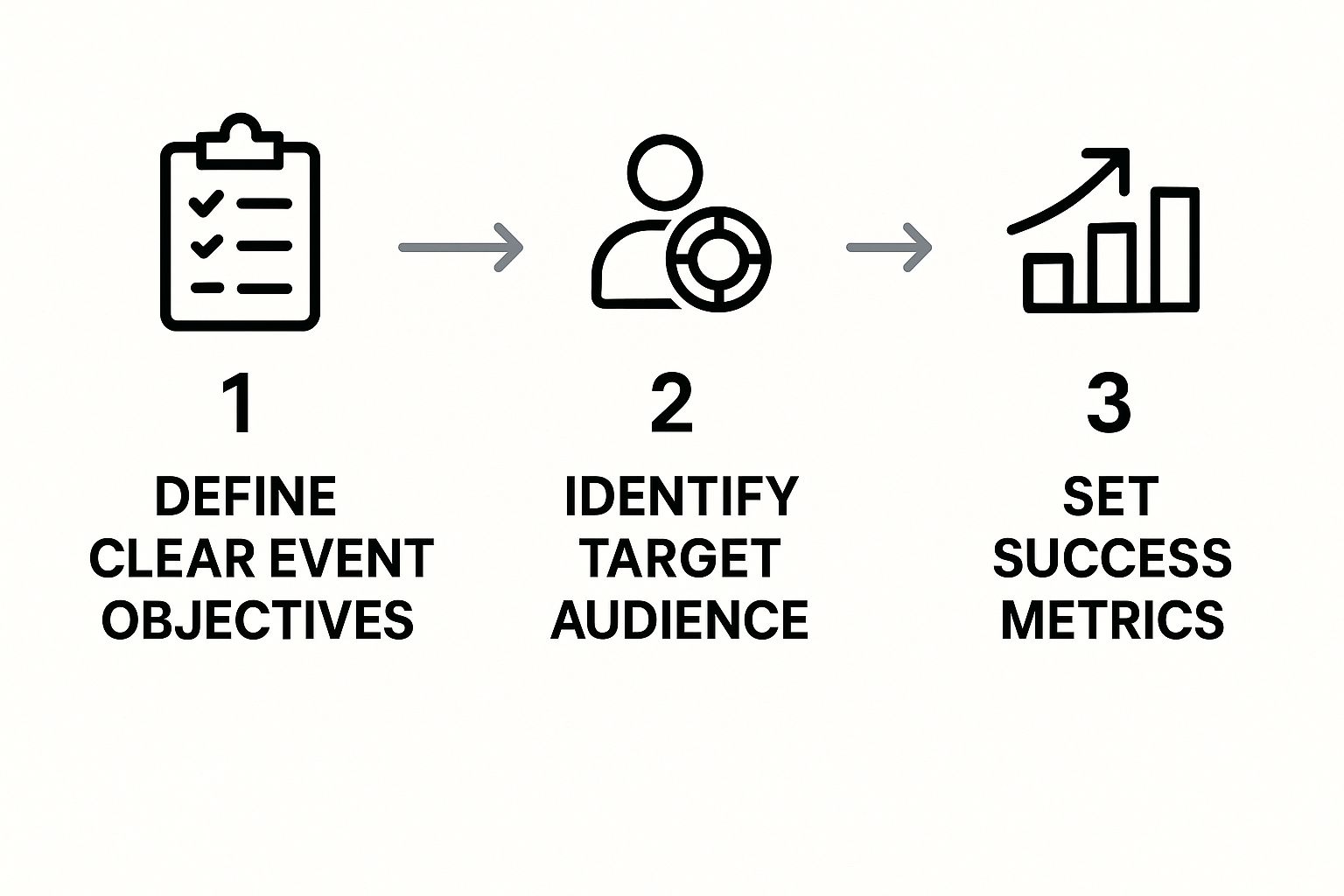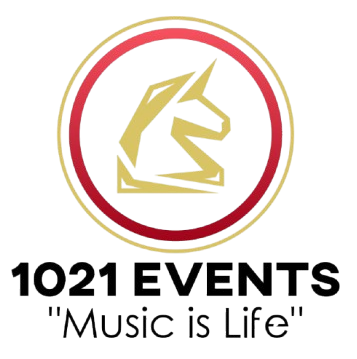Before you even think about tasting menus or looking at venues, every single corporate event I've ever planned successfully started with the same three questions: Why are we doing this? Who is this for? And how much can we spend?
Get these three things straight, and you’ve built a solid foundation. Everything else that follows—from picking the right speakers to choosing the perfect napkins—just clicks into place. It’s all about strategy before logistics.
Your Foundational Event Planning Framework
Think of this as the blueprint phase. You wouldn't order furniture for a house that hasn't been designed yet, right? The same logic applies here. This initial stage is all about making sure every decision you make down the line is smart, strategic, and directly supports your company's goals.
Define Your "Why"
First things first, let's get brutally honest about the purpose of this event. A vague goal like "boosting morale" is a nice thought, but it won't help you make tough decisions later. You need specific, measurable objectives that you can actually track.
- Launching a Product? Your goal might be: "Secure media coverage in five key industry publications and get pre-orders from 10% of attendees."
- Need More Leads? Try this: "Our goal is to generate 150 qualified leads from enterprise-level tech companies at our annual showcase."
- Focusing on Team Culture? A better goal is: "Improve cross-departmental collaboration, aiming for a 20% bump in positive feedback on our internal communication surveys post-event."
See the difference? These sharp, clear goals become your North Star.
Whenever you're stuck on a decision, just ask yourself: "Does this actually help us hit our main objective?" If the answer is no, it's an easy cut.
Identify Your "Who"
Okay, you know your "why." Now, who absolutely needs to be in that room for you to achieve it? Really dig into your target audience. An event for C-suite executives is going to have a completely different vibe, schedule, and feel than a hands-on workshop for software developers.
Think about what they care about, what their daily headaches are, and what would make them feel like this event was a genuinely valuable use of their time. The more you know about your "who," the more you can tailor an experience that really connects. For a deeper dive, you can learn more about crafting a comprehensive strategy here: https://1021events.com/how-to-plan-a-successful-event/
This simple flow really captures the core of where to start.

Nailing these first three steps—objectives, audience, and metrics—is the secret sauce to any great event strategy.
Set Your "How Much"
Time for a reality check. Your grand vision needs to be tied to a budget. This doesn't have to be a super-detailed, line-item spreadsheet just yet. Think of it as a high-level estimate to keep your ambitions grounded. It's a crucial step, especially now. With the events market projected to explode to $2.5 trillion by 2035 and 78% of marketers saying live events are their most powerful tool, you have to be smart with your money.
For a quick overview of how these pieces fit together, take a look at this table.
Corporate Event Planning At a Glance
| Planning Phase | Key Actions | Primary Goal |
|---|---|---|
| Foundation (Pre-Planning) | Define event purpose (the "why"). Identify the target audience (the "who"). Set a preliminary budget (the "how much"). | To create a clear, strategic blueprint that guides all future decisions. |
| Logistics & Coordination | Select venue & vendors. Manage contracts & timelines. Plan agenda & content. | To build the tangible framework of the event and secure all necessary resources. |
| Marketing & Promotion | Develop a marketing plan. Create promotional materials. Drive registrations & build hype. | To ensure the right people know about the event and are excited to attend. |
| Day-Of Execution | Manage on-site logistics. Coordinate staff & volunteers. Handle any unexpected issues. | To deliver a smooth, professional, and engaging experience for all attendees. |
| Post-Event Wrap-Up | Send follow-up communications. Gather feedback through surveys. Analyze performance against KPIs. | To measure success, prove ROI, and gather insights for future events. |
This table gives you a bird's-eye view of the entire journey, from that initial spark of an idea to the final report.
One cost people often forget early on is tech. Reliable internet isn't a luxury; it's essential. Get some practical tips on setting up guest WiFi for your event so you can factor that cost in from the get-go.
Once you’ve mastered these three pillars—why, who, and how much—you'll have a rock-solid plan, and you'll be ready to dive into the nitty-gritty details of bringing it all to life.
Mastering Your Event Budget Without the Stress
Alright, let's talk about the budget. It's the one thing that can either bring your incredible vision to life or stop it dead in its tracks. Honestly, this is where the big ideas slam into financial reality, but it doesn't have to be a nightmare. The secret is having a solid strategy from the get-go.
Think of your budget as your financial blueprint. It’s not just a boring spreadsheet of costs; it's the road map that guides every single decision you make, ensuring you're spending money where it will have the biggest impact on your event goals.
Building Your Budget From the Ground Up
First things first, you need to do a massive brain dump of every possible cost you can think of. I mean everything. It’s always better to start with a ridiculously long list and cut back later than to get blindsided by surprise expenses down the road.
I recommend grouping potential costs into big categories. This isn't just for the obvious stuff like the venue. You’ve got to dig deeper—from your keynote's flight and hotel to the ink and paper for the name badges.
To get your gears turning, here are some common buckets to consider:
- Venue Costs: Think beyond the rental fee. What about insurance, security, and post-event cleaning?
- Food & Beverage: This includes per-head catering, bar packages, coffee stations, and even meals for your event staff.
- A/V & Production: Good sound and visuals are essential. Here at 1021 Events, we know this is make-or-break. Factor in mics, speakers, projectors, lighting, and the crew to run it all.
- Marketing & Promotion: How will people find out? Budget for social media ads, email platforms, printed materials, and your event website.
- Speakers & Entertainment: Don't just budget for their fee. Remember to include their travel and lodging costs.
- The Little Things: This is where you'll put signage, name tags, swag, attendee transportation, and event planning software.
Yes, this initial list will look intimidating. But trust me, it’s a crucial step to truly grasp what your event is going to cost.
The Non-Negotiable Contingency Fund
If you take only one piece of advice from me, let it be this: always, always have a contingency fund. This is your financial safety net for when things inevitably go sideways.
Picture this: your beautiful outdoor cocktail hour is suddenly in the path of a thunderstorm. You need tents, and you need them now. Or your headliner’s flight gets canceled, and the only other option is a pricey last-minute booking. These are the moments when a contingency fund saves the day.
My rule of thumb is to set aside 10-15% of your total budget for contingency. If you don't touch it, fantastic! You're under budget. But if you need it, you’ll be so relieved it’s there.
This isn't "fun money" for last-minute splurges. It's a risk management tool that keeps your event on track. This kind of forward-thinking is just as critical in corporate planning as it is in the non-profit world, where every penny counts. For more on that, take a look at our guide on how to succeed with non-profit event planning.
Tracking and Managing Your Spending
Your budget is a living, breathing document. You can't just create it and forget about it. You need a system to track every single expense as it happens. This is the only way to know where you stand at any given moment and make smart pivots when you need to.
This active management is especially vital when vendors are involved. It's no surprise that a recent report highlighted that budget management is the biggest headache for 40% of planners. With 65% struggling with expensive A/V services and a whopping 75% getting hit by rising food and beverage costs, keeping a close eye on your spending is non-negotiable. You can see more on the financial pressures planners are facing in this detailed report on event industry statistics.
By tracking expenses in real time, you can spot if you're about to go over budget and find places to trim the fat early. Maybe those custom-printed cocktail napkins aren't as vital as upgrading the coffee for the morning session. Having the numbers right in front of you empowers you to make those tough calls without wrecking the attendee experience.
Assembling Your Event Dream Team

Let's be real: an event is the ultimate team sport. And your vendors? They aren't just suppliers—they’re your star players. The absolute success of your corporate event comes down to the team you build to bring your vision to life. This is way more than just hiring people; it's about creating a tight-knit crew of reliable partners who are all on the same page.
When you're thinking about how to plan corporate events that people actually remember, a huge chunk of that is vendor selection. A stunning venue with a horrible caterer, or a fantastic speaker with a glitchy A/V setup, can tank the whole experience. Your mission is to assemble a dream team that works like a well-oiled machine.
The Foundation: A Detailed Event Brief
Before you even dream of sending out a request for a proposal (RFP), you need to get your vision down on paper. This is where your event brief comes in. Think of it as your event's bible—it's the single most important tool for getting your entire team aligned.
A solid brief makes sure every potential vendor knows exactly what you're trying to do, from the big-picture goals right down to the nitty-gritty details. It cuts down on misunderstandings, helps you get much more accurate quotes, and establishes a clear benchmark for what success looks like.
Your event brief should lay out:
- Event Overview: The classic who, what, when, where, and why of your event.
- Goals & KPIs: What's the win? Maybe it's to "generate 100 sales leads" or "achieve 90% attendee satisfaction." Be specific.
- Target Audience Profile: Paint a picture of your ideal attendee. Who are they? What do they care about?
- Budget Breakdown: A clear look at what you can realistically spend on each major category.
- Key Logistical Needs: A draft agenda, A/V requirements, catering preferences, and any specific tech you'll need.
A thorough brief immediately signals to vendors that you're a professional who's done their homework. Honestly, this alone will attract higher-quality partners who are serious about doing great work.
Vetting Your Key Partners
With your brief ready, you can start the hunt. Sure, online reviews and fancy websites are a decent starting point, but you've got to dig deeper to find partners you can truly count on. That means getting on the phone and asking some tough, direct questions.
The single best piece of advice I can give is to always check references. I'm not talking about the polished testimonials on their website. Ask for the contact info for two or three recent clients and have a real conversation with them.
When you talk to a reference, you can uncover pure gold. Ask questions like, "How did they handle it when something went wrong?" and "What was their communication like in the final week before the event?" The answers will tell you far more than any proposal ever could.
Key Questions for Your Vendor Checklist
When you're meeting with potential vendors, go in prepared with a checklist of questions. This isn't just about getting the best price; it's about gauging their capabilities, reliability, and whether they'll be a good partner.
Here’s a breakdown of what to ask your most critical vendors:
| Vendor Type | Key Questions to Ask | What to Look For in the Answer |
|---|---|---|
| Venue | What's included in the base rental fee, and what are the common add-on costs? Do you have an exclusive vendor list we have to use? What's your backup plan for the outdoor spaces? | Total transparency about all potential fees. Flexibility with other vendors. A clear, well-rehearsed inclement weather plan. |
| Caterer | Can you easily handle dietary restrictions like gluten-free, vegan, and severe allergies? What are your staff-to-guest ratios for different service styles? Can we schedule a tasting? | Confidence and proven experience with special diets. Clear staffing standards. An enthusiastic "of course!" to a tasting. |
| A/V Provider | Will we have an on-site technician dedicated solely to our event? Can you show me examples of your work at our specific venue? What are your power and rigging requirements? | The guarantee of dedicated on-site support. Familiarity with the venue's potential issues. Proactive questions about your technical needs. |
This whole process is your first line of defense against those day-of disasters. Pay attention not just to what they say, but how they say it. Do they sound organized? Passionate? Do they actually seem to get your vision? Trust your gut—it's usually right. Building a rock-solid team is the foundation of every great event.
Designing an Unforgettable Attendee Experience
Alright, the heavy lifting on logistics is done and your vendors are all lined up. Now comes the fun part—the part that actually makes or breaks your event: designing what your guests will actually see, do, and feel. This is where we shift from being a planner to being an experience architect.
Let's be honest, nobody wants to go to another stuffy, mandatory corporate function. The goal is to create something people are genuinely buzzing about, an experience they’d be sad to miss. And it all starts with two key pieces: a killer agenda and a smart marketing plan to get the word out.
Structuring an Agenda That Actually Engages
A great agenda is a balancing act. If people are just sitting and listening for eight hours straight, you'll see them scrolling on their phones by lunch. But if you cram in too many activities, they'll just feel herded and exhausted. You're looking for a natural rhythm that keeps the energy up from the opening speech to the final goodbye.
First thing's first: map out your day with your main goals front and center. Every single session, coffee break, or networking hour needs to have a purpose.
- Set the Tone with Keynotes: Your main stage speakers are your anchors. Use them to deliver the big, unifying ideas that get everyone on the same page and excited for what's to come.
- Let People Choose Their Path: Breakout tracks are a game-changer. They let attendees self-select into smaller, more specific sessions that are directly relevant to their roles or interests. It gives them a sense of ownership over their day.
- Build in Real Networking Time: This is where the real magic happens, but it’s so often overlooked. Don't just call it a "15-minute coffee break." Schedule generous breaks and a relaxed lunch. People need time to actually talk, not just grab a croissant and run.
This mix of guided and self-directed time is the secret sauce. You deliver the core message while they get to customize the details. It's a win-win that sends attendee satisfaction through the roof.
I see this mistake all the time: a schedule packed to the minute. You have to build in white space. People need a moment to breathe, check an email, and most importantly, actually follow up with the person they just met.
Promoting Your Event to Build a Buzz
Your marketing isn't just about selling tickets; it's about building a community long before the event starts. A great promotional plan doesn’t just list what’s happening—it screams about the value of being there.
Think about where your audience lives online and off. You’ll want to hit them from a few different angles to make sure your message sticks.
A Simple but Powerful Marketing Mix:
- Email Campaigns: Don't just send one blast. Create a sequence. Start with a "Save the Date," then reveal your keynote speakers, drop the full agenda, and finally, create some urgency with "last chance" reminders.
- Social Media: Use a platform like LinkedIn to share professional tidbits, cool quotes from your speakers, and maybe some behind-the-scenes photos. Create a unique event hashtag and get everyone—speakers, sponsors, even early registrants—to start using it.
- Content Marketing: Write blog posts that tie into your event's theme. Hosting a sales conference? Publish a killer article on "The Future of B2B Sales" and casually mention that the author will be diving deeper into the topic at your event.
This multi-channel approach creates a constant, low-level hum of excitement around your event, keeping it top-of-mind.
Of course, the event content itself is a massive promotional tool. People are drawn to cool, unique experiences. For some fresh inspiration, check out our guide on corporate event entertainment ideas that can really give your agenda that "wow" factor people will talk about.
The industry's own numbers show just how powerful these events are. Corporate events are a huge deal, with 61.2% of UK planners focused on them and a market expected to hit $1.553 trillion by 2028. And don't let anyone tell you virtual has taken over—nearly 70% of North American planners still prefer in-person events because face-to-face connection is just that important.
Ultimately, your marketing needs to tell a compelling story. It should paint a picture of an experience so valuable, so unmissable, that your audience feels they can't afford not to be there. When your agenda and your marketing are in sync, you don’t just fill a room—you build a loyal following.
Executing a Flawless Event on the Big Day

The doors are about to open. After months of painstaking planning, endless phone calls, and budget gymnastics, this is the moment it all comes together. Event day is where the magic happens, but it’s also when the pressure is cranked to the max. This isn’t the time to panic—it’s time to execute with confidence.
Your secret weapon for a smooth day isn't a rabbit's foot or crossed fingers. It's a detailed, minute-by-minute plan that leaves absolutely nothing to chance. This is your playbook for managing the day and delivering an experience that feels effortless to your guests, even if you’re paddling like mad under the surface.
Your Event Day Bible: The Run-of-Show
The single most critical document on event day is your run-of-show. This isn’t just a simple agenda. Think of it as the master script for the entire production, detailing every single action from the moment the first vendor arrives for setup to when the last piece of gear is loaded out.
It's the blueprint that keeps everyone in sync. A solid run-of-show breaks down every segment with columns for:
- Time: The exact moment something happens (e.g., 8:15 AM).
- Action: A clear description of the activity (e.g., "Main stage lights dim for opening video").
- Who's in Charge: The specific person or team responsible (e.g., "A/V Team – Mark").
- Notes & Cues: Crucial details like a speaker’s walk-on music or which slide needs to be on screen.
This document is your lifeline. Make sure it’s in the hands of all key players—your venue manager, A/V crew, caterer, and internal staff—so everyone is working from the same game plan.
The Power of the Pre-Event Huddle
About an hour before you open the doors, pull your entire on-site team together for a pre-event huddle. This is more than a pep talk; it’s a final alignment session to make sure everyone is dialed in and ready for action.
Use this time to walk through the run-of-show one last time, confirming key roles and responsibilities. Clarify the chain of command—who makes the final call if something unexpected happens? This is also your chance to get everyone mentally prepared and energized for the day ahead.
A little pro-tip I’ve picked up over the years: end every huddle by reminding your team why you're all there. It shifts the focus from just checking off tasks to creating a fantastic experience for every single attendee.
A unified team is your best defense against chaos. They need to know their roles inside and out. A truly expert team is what separates a good event from a great one, and a deep understanding of corporate event production is what makes it all click.
Proactive Troubleshooting for Day-Of Curveballs
Let's be real: no matter how perfectly you plan, something will go sideways. A keynote speaker gets stuck in traffic, a microphone battery dies mid-sentence, or the registration line suddenly snakes out the door. The difference between a minor hiccup and a full-blown disaster is having a solid contingency plan.
Before the event, brainstorm potential problems and map out your solutions.
- Sudden Registration Crush? Have extra staff on standby, ready to jump in with tablets for mobile check-in to bust that line.
- A/V Glitches? Your A/V provider should have backup equipment—mics, clickers, laptops—on-site and ready to be swapped out in seconds.
- Last-Minute Speaker Change? Keep a "filler" plan in your back pocket. This could be a short, pre-recorded company video or a quick audience poll to keep people engaged while you adapt on the fly.
The key is to stay calm. Your attendees take their cues from you and your team. If you project confidence and handle issues with a cool, professional demeanor, most guests won't even notice. This ability to gracefully manage the chaos is the mark of a pro who truly knows how to plan corporate events that deliver.
So, The Event's Over. Now What?

Think the event is over once the lights go down and the last guest heads home? Think again. Honestly, some of the most crucial work is just getting started. This is your moment to prove the event was worth it and turn all that positive energy into something tangible for your company.
The buzz you created has a shelf life. The connections, the ideas, the excitement—it all fades fast. That's why your follow-up game needs to be immediate and thoughtful. This is what separates an event that's quickly forgotten from one that makes a lasting impact.
Find Out What They Really Thought
Before you can even think about ROI, you need to get the real story from your attendees. The best way to do this? A post-event survey. Get it into their inboxes within 24 hours, while the experience is still fresh. Any later, and you'll see your response rates plummet.
Don't make it a novel. Keep the survey short, sweet, and to the point. Most importantly, ask questions that actually connect back to the goals you set in the very beginning.
- About the Content: "Which session was a home run for you, and why?"
- About the Experience: "On a scale of 1-5, how was the check-in process? What about the food?"
- The Big Picture: "What was your favorite part of the entire event?"
- Looking Ahead: "Would you come back for another event like this next year?"
This feedback isn't just for fluff—it's gold. It tells you what worked, what didn't, and gives you a concrete blueprint for making your next event even better.
The point isn't just to fish for compliments. You're digging for the why behind the what. That's the insight you'll use to justify the budget and prove the event’s value to the higher-ups.
Keep the Conversation Going
Don't let the dialogue die. Your job now is to keep the event alive in people's minds by sharing content that reminds them of the great time they had and reinforces your key messages.
A personalized thank-you email is non-negotiable. Send one to every single attendee, sponsor, and speaker. It's a simple touch that means a lot. In that email, drop a link to a photo gallery or a slick highlight video. You can even share recordings of the most popular sessions, giving people a chance to re-watch a favorite or catch something they missed.
This follow-up strategy is a huge piece of the puzzle, and knowing how to measure event success is the key to proving its worth. By nurturing these new relationships and analyzing the data, you transform a one-time gathering into a long-term asset for your brand.
Your Corporate Event Planning Questions Answered
https://www.youtube.com/embed/o4M9Ng4LSto
Even with the best checklist in hand, you're bound to run into some specific questions along the way. It happens to everyone! Let’s tackle a few of the most common hurdles I see clients face when they’re figuring out how to plan a corporate event.
How Far in Advance Should I Start Planning?
Honestly, the golden rule is that it’s never too early. The bigger your vision, the more runway you'll need.
For a major conference, a big holiday bash in December, or anything with a large guest list, you should really start locking things down 9–12 months ahead of time. This gives you first dibs on the best venues and the most sought-after vendors before they're all booked up.
If you're planning something smaller—say, a team-building activity or a workshop for under 100 attendees—you can usually get away with a 3–6 month lead time. That's plenty of time to find great partners, get the word out, and manage registrations without pulling your hair out.
A quick word of advice from experience: don't drag your feet on booking a venue. I’ve seen great event plans get derailed because the top-choice location was snapped up while the team was still "discussing." Locking it in early is always the safer bet.
What Is the Best Way to Handle Dietary Restrictions?
This is where a good planner really shines. Making sure every guest feels seen and cared for is crucial, and that definitely includes their dietary needs.
The key is to get ahead of it. Add a simple, clear question to your registration form asking about allergies or specific requirements like vegan, gluten-free, or kosher. Don't make it optional!
Once you have that list, send it over to your caterer ASAP. Any professional caterer will be well-equipped to handle these requests and can often suggest some fantastic alternatives that don't feel like an afterthought. At the event itself, use labeled buffet cards, or even discreet place cards for plated meals, so guests can easily find their food without any fuss.
Here are some quick answers to other common questions that pop up during the planning process.
Frequently Asked Questions
| Question | Answer |
|---|---|
| How do I create a realistic event budget? | Start by listing all potential expenses, from venue and catering to marketing and staffing. Research average costs in your area and then add a 10-15% contingency fund for unexpected costs. |
| What's the best metric for measuring event success? | It depends on your initial goals. If it was lead generation, track new leads. If it was brand awareness, monitor social media mentions and web traffic. For internal events, post-event surveys on employee satisfaction are key. |
| Should I hire a professional event planner? | If you have a complex event, a large guest list, or a limited internal team, hiring a pro can save you time, money, and stress. Their industry connections and experience are invaluable. |
| How can I increase attendee engagement? | Incorporate interactive elements like live polls, Q&A sessions, workshops, or even a fun photo booth. The goal is to make your guests active participants, not just passive observers. |
Hopefully, these quick tips help clear up some common points of confusion. Every event has its own unique challenges, but a proactive approach can solve most of them.
Planning a corporate event that people actually talk about for weeks requires more than just good logistics—it needs a creative spark. At 1021 Events, we’re experts at bringing that magic with professional DJ/MC services, custom lighting, and top-tier production that turns your vision into a reality.
Let us worry about the technical details so you can enjoy the event with your guests. Check out our corporate event services and let’s start planning something amazing.




